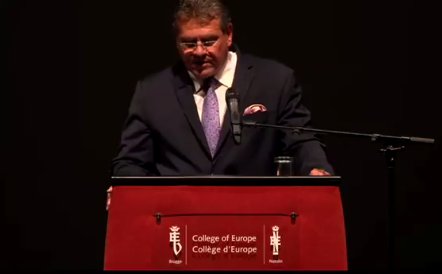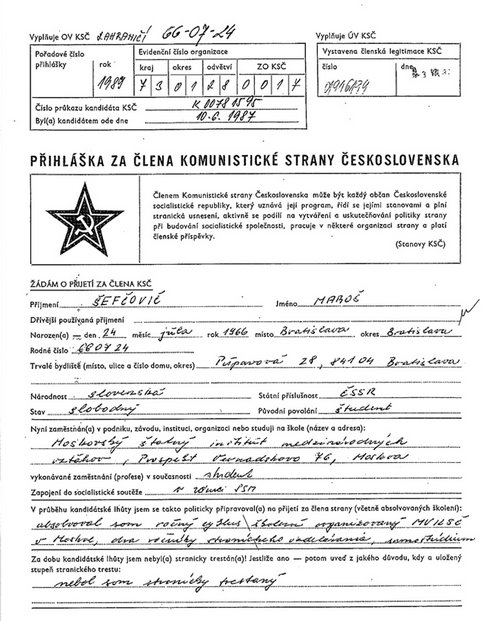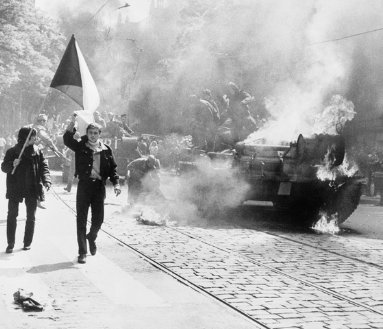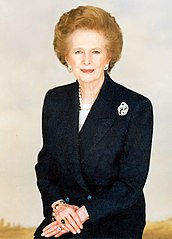Who on earth did Lord Frost’s opposite number in the EU think he would fool?
The ‘Iron Lady’ and the speech by the EU’s former Soviet Communist

© Facts4EU.Org 2021
Part two of Facts4EU.Org’s report on the EU Vice President’s bizarre ‘Bruges speech’
Yesterday we reported on the ‘Bruges speech’ delivered by EU Vice President Maroš Šefčovič on Friday last week to the ‘College of Europe’ – some 33 years after the famous Bruges Speech delivered by Baroness Thatcher in 1988.
This is important to the United Kingdom because it is Mr Šefčovič who is now in charge of negotiations with Lord Frost on all aspects of Brexit.
In his lengthy speech about the EU’s relations with the UK, we pointed out that Mr Šefčovič had quoted Baroness Thatcher six times, seeming to suggest that she was actually in favour of the EU. This is a gross misrepresentation, which we shall come on to. Before we do that, we have a question for readers. (Photo right: Mr Šefčovič on Friday)

The ‘Iron Lady’ and the EU's former Soviet Communist
When the ‘Iron Lady’ was making her speech in Bruges in 1988,
would readers like to take a wild guess where Mr Šefčovič was living?
Answer: Moscow, where he lived and studied for five years.
In 1985 Maroš Šefčovič left his home country, the Soviet puppet state of Czechoslovakia, and headed east to Moscow for five years. In going east to Russia Mr Šefčovič did not suffer the fate of hundreds of his fellow countrymen and women who had been killed attempting to cross the border in the opposite direction, to the West.
The EU Vice President spent five years in Moscow, at the elite university called the ‘Moscow State Institute of International Relations’.
Two years after his arrival he submitted his application for formal membership of the Czechoslovak Communist Party (KSČ). In those days Party membership was a big thing and was not granted to everyone.
Fortunately the National Archive in Prague holds records of such people and to the right is a copy of his successful application. (Credit: Dennik / Národní archiv)

The Prague Spring and the ‘Velvet Revolution’
In the mid-1960s Czechoslovakia had slowly been attempting to liberalise. In August 1968 this ‘Prague Spring’ was brutally crushed by Moscow, when tanks and some 500,000 troops from the Warsaw Pact invaded and the Soviet Union was able to demolish the Dubcek government and bolster the power of the hardline KSČ.

At the time that Maroš Šefčovič left for Moscow only 17 years later, the brutal suppression of the flowerings of a liberal society (including many deaths as a result) in his home country were of course completely fresh in the minds of its citizens.
This did not deter Mr Šefčovič on his journey to become more ingrained in the study of Marxism-Leninism in the capital city of the country which was the author of the violence and oppression.
The writing was finally on the (Berlin) wall for the EU’s now Vice President
It was only in 1990, following the fall of the Soviet Union, that Maroš Šefčovič returned to his home country.
At this point it is worth noting that the demise of the Eastern Bloc was caused in no small part by the rigorous stance of Baroness Thatcher and of President Ronald Reagan. This is the same Margaret Thatcher – as she then was – whom Mr Šefčovič chose to quote many times in his speech last week in Bruges.
Vice President Šefčovič on the Brussels gravy train
Since that time, Maroš Šefčovič has exclusively pursued a career in academia and politics. This career even included a time as Slovak Ambassador to Zimbabwe. He has worked in Brussels since 2004 and has been an EU Commissioner for 12 years.
Facts4EU.Org has been unable to find any evidence that the EU Vice President has ever held a job outside politics or has had any experience whatsoever of business or trade. We even accessed his ‘declaration of interests’ held at the EU Commission in Brussels, and there isn’t one single personal commercial activity, investment, or interest listed.
This is the man now in charge of negotiations with the UK's Lord Frost and his team on matters such as trade and financial services.
Finally, what did Baroness Thatcher actually say about the (future) EU?

In his ‘EU Bruges speech’ last Friday, the EU Vice President seemed to want to invoke the late Baroness Thatcher in support of a new EU superstate and empire, by selectively quoting short phrases from her 1988 speech.
In fact Margaret Thatcher’s speech became famous for its renunciation of the ‘European Community’ project, talking of the “willing co-operation between independent, sovereign states”, “perusing policies that relate supply more closely to market requirements”, and the “need for the Community to encourage enterprise”.
Below are some other quotations from that famous Bruges Speech.
Brexit Facts4EU.Org Summary
Some key excerpts from Baroness Thatcher's Bruges Speech, 1988
The opening words
“Mr. Chairman, you have invited me to speak on the subject of Britain and Europe. Perhaps I should congratulate you on your courage. If you believe some of the things said and written about my views on Europe, it must seem rather like inviting Genghis Khan to speak on the virtues of peaceful coexistence!”
On the United Kingdom’s sacrifices for Europe
“But we British have in a very special way contributed to Europe. Over the centuries we have fought to prevent Europe from falling under the dominance of a single power. We have fought and we have died for her freedom.”
Other quotations from the speech
“The Community is not an end in itself. Nor is it an institutional device to be constantly modified according to the dictates of some abstract intellectual concept. Nor must it be ossified by endless regulation.”
“To try to suppress nationhood and concentrate power at the centre of a European conglomerate would be highly damaging and would jeopardise the objectives we seek to achieve.”
“We have not successfully rolled back the frontiers of the state in Britain, only to see them re-imposed at a European level with a European super-state exercising a new dominance from Brussels.”
“If we cannot reform those Community policies which are patently wrong or ineffective and which are rightly causing public disquiet, then we shall not get the public support for the Community's future development.”
“The lesson of the economic history of Europe in the 70's and 80's is that central planning and detailed control do not work and that personal endeavour and initiative do. That a State-controlled economy is a recipe for low growth and that free enterprise within a framework of law brings better results.”
“Our aim should not be more and more detailed regulation from the centre: it should be to deregulate and to remove the constraints on trade.”
And finally
“Let Europe be a family of nations, understanding each other better, appreciating each other more, doing more together but relishing our national identity no less than our common European endeavour. Let us have a Europe which plays its full part in the wider world, which looks outward not inward, and which preserves that Atlantic community—that Europe on both sides of the Atlantic—which is our noblest inheritance and our greatest strength.”
Observations
Originally we had planned a textual analysis and dissection of Mr Šefčovič’s long speech on Friday. In the end we decided to let viewers judge it on its merits, with the added benefit of some knowledge about who was giving it.
Even the most cursory look at the late Baroness Thatcher’s Bruges Speech shows that she desired a relatively loose confederation of European countries working together in their common interests.
If she saw what the EU has become today there can be no doubt that she would be simply appalled. As indeed are we.
Facts4EU.Org and you
We present facts-based research that most of the MSM fails to provide, and through that we give a voice to a more common-sense approach that is shared and sought by so many people. Most of our readers are well-informed and appreciate our fact-based articles, presented in a way you won't see anywhere else. Please help our work with a donation. We have far more to do in researching, publishing, campaigning and lobbying Parliament than we have in terms of the financial resources to fulfil these tasks. We badly need funding to continue - we rely 100% on public donations from readers like you. We are a 'not for profit' team (we make a loss) and any donation goes towards the actual work, not plush London offices, lunch or taxi expenses, or other luxuries of some organisations. Nor do we ask you for further donations if you donate once - we just hope that you keep supporting us. Your donation stays anonymous unless you tell us otherwise.
If you believe in a fully-free, independent, and sovereign United Kingdom, please make a donation now. It’s quick, secure, and confidential, and you can use one of the links below or you can use our Donations page here. You will receive a personal, friendly ‘thank you’ from a member of our team within 24 hours. Thank you for reading this.
[ Sources: EU Commission | Dennik/Národní archiv | The Thatcher Foundation | The Bruges Group ] Politicians and journalists can contact us for details, as ever.
Brexit Facts4EU.Org, Tues 22 Jun 2021
Click here to go to our news headlines
Please scroll down to COMMENT on the above article.
And don't forget to actually post your message after you have previewed it!
Since before the EU Referendum, Brexit Facts4EU.Org
has been the most prolific researcher and publisher of Brexit facts in the world.
Supported by MPs, MEPs, & other groups, our work has impact.
We think facts matter. Please donate today, so that we can continue to ensure a clean Brexit is finally delivered.
Paypal Users Only - Choose amount first
Quick One-off
Monthly


Something to say about this? Scroll down for reader comments